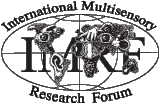Tasting with eyes.
Last modified: 2011-09-02
Abstract
Whenever we eat and drink something, we experience the sense of taste. We attribute the sense of taste to gustation without doubt, but it is not true. The olfaction is the most important component of the flavor. On the other hand, the gustation (basic tastes) is affected strongly by the olfaction; when participants tasted solutions containing odors without any tastants, they reported there were some tastes. Odors of the foods and beverages show interaction with (potentiate and/or inhibit) basic tastes, and determined the flavor of them.
Here, some experiments exploring about the role of the vision in the sense of taste are shown: The color of sushi distorted (enhanced or eliminated) the perception of fishy, the color of the packages of chocolate distorted the perception of taste, the color of syrup determined the participants’ ability of identification of the flavor, and so on. These results show the vision is an important component of the sense of taste.
These visual effects on taste are supposed to be mediated by the olfaction. It is because there are many studies showing the vision affects the olfaction, but studies showing the vision affects gustation are very little and inconsistent with each other.
Here, some experiments exploring about the role of the vision in the sense of taste are shown: The color of sushi distorted (enhanced or eliminated) the perception of fishy, the color of the packages of chocolate distorted the perception of taste, the color of syrup determined the participants’ ability of identification of the flavor, and so on. These results show the vision is an important component of the sense of taste.
These visual effects on taste are supposed to be mediated by the olfaction. It is because there are many studies showing the vision affects the olfaction, but studies showing the vision affects gustation are very little and inconsistent with each other.


